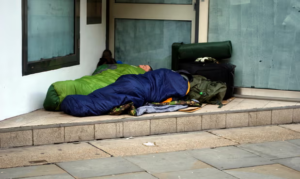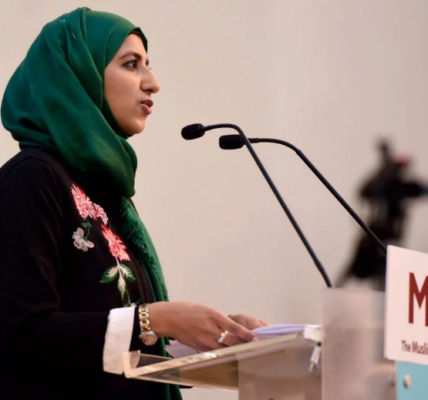Centrepoint records 564 instances of ‘gatekeeping’ including dozens involving young people who were pregnant or had children

Some young people were rejected because they were wrongly judged to have no local connection or to have made themselves homeless. Photograph: Ashley van Dyck/Alamy
Hundreds of homeless young people, including dozens who are pregnant or have children, are being illegally turned away by councils when they ask for help, the Guardian has learned.
As government figures showed the number of households with children living in temporary accommodation in England rose 15% in the last year to nearly 75,000, it emerged that a young pregnant woman who was sleeping rough was refused support because she “wasn’t 20 weeks” into her pregnancy. Others were rejected because they were wrongly judged to have no local connection or to have made themselves homeless – in one case despite a person having fled domestic abuse.
The cases are among 564 instances of “gatekeeping” by council officials recorded by helpline operators at Centrepoint, a homelessness charity. The Ministry of Housing, Communities and Local Government (MHCLG) said the problem was “extremely concerning”.
Councils and homelessness charities have said they need more funding to protect vulnerable people. On Thursday, annual homeless data for England showed 146,430 households were assessed as being threatened with homelessness and therefore owed a prevention duty in 2023-24, up 3.1% in the year.
The number of families living in temporary accommodation rose by 12% to more than 117,000 after several years of stability. The number of asylum seekers needing help because they were required to leave Home Office accommodation more than doubled to 3,420 households, and the number of households who needed help owingto rent arrears because of a rent rise almost doubled to 590 households.
Centrepoint said its helpline recorded 82 cases in the last 14 months where homeless people aged between 16 and 25 who had children or were pregnant were turned away by councils, and helpline staff say this is increasingly common.
Paul Brocklehurst, the charity’s senior helpline manager, said staff were spending increasing amounts of time advocating for council staff to provide homelessness assessments and temporary accommodation, as is their duty under the Homelessness Reduction Act and Housing Act.
“The blame can’t just lie with councils though,” he said. “Decades of chronic underfunding from central government have forced many to make impossible decisions around who gets what support. The new government must urgently address this.”
This week the County Councils Network said that without a multi-billion pound boost to their funding they would be reduced to “little more than care services”, for which they have a statutory duty.
“It is unacceptable that people, often at their most vulnerable, are experiencing homelessness – and we want to make sure they can find a secure home,” a spokesperson for the MHCLG said. “Councils have a duty to ensure vulnerable people are not left without a roof over their heads and we have committed to working with them and local leaders to develop a long-term strategy to end homelessness once and for all.”
Adam Hug, the housing spokesperson for the Local Government Association, said councils were “doing their best to meet their duties to vulnerable young people at a time when they are under mounting pressure to find suitable homes for an ever-increasing number of people”.
He said paying for temporary accommodation for 113,000 households cost councils £1.75bn a year.
The problem of illegal gatekeeping comes as several homelessness charities, including St Mungo’s and Shelter, warned that services to get and keep people off the streets were “at significant risk” if a £500m funding stream from central government to local authorities, due to end in March, was not extended.
The 2022 rough sleeping initiative has helped fund about a third of St Mungo’s services in London – costing nearly £18m and including a housing first scheme that prioritises getting rough sleepers into accommodation. The charities want the funding to be extended for three years at the budget on 30 October.




